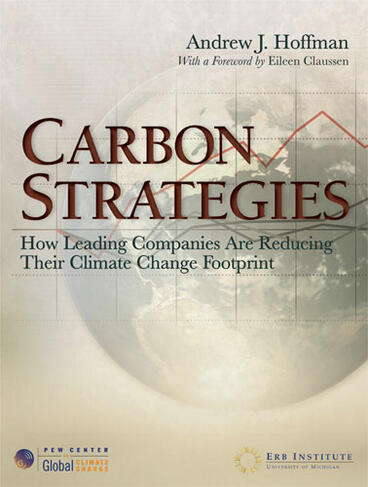Carbon Strategies
How Leading Companies Are Reducing Their Climate Change Footprint
A clear, practical guide to sustainable climate policy for business leaders and corporate change-makers
Description
“Climate change’s impacts cut across all functional areas of a business. The systematic approach proposed in this report will be very helpful to business managers concerned with integration of business activities in operations, marketing, finance, and human resources to support a consistent, pro-active strategic response to climate change.”
—Karen Flanders, Director, Corporate Responsibility, The Coca-Cola Company
“Carbon Strategies captures the risks, and opportunities, for companies in an increasingly carbon-constrained marketplace. This book will be invaluable to any executive seeking insight into strategies for success in this changing business climate.”
—William L. Thomas, Americas Environment Head, Clifford Chance US LLP
“For any manager who has been charged by the CEO to develop a climate change strategy, this book is for you. It offers plainspoken wisdom garnered from over 30 companies on how best to address climate change as a business issue. It takes much of the guesswork and expense out of testing unproven ideas, and puts you on the right path towards addressing this critical issue in a way that benefits the bottom line and the environment.”
—Fred Krupp, President, Environmental Defense
“In order to preserve the stability and growth of the world’s economy and all of the opportunities it affords, we must protect the global environment. Climate change represents one of the most significant issues of risk and reward facing CEOs and investors today. Hoffman offers a very helpful framework for the analysis.”
—Michael Klein, Chairman and Co-Chief Executive Officer, Citi Markets & Banking Vice Chairman, Citibank International PLC
“Future generations will look back with either admiration or despair, judging how well we, in these early years of the twenty-first century, addressed critical climate-change issues. Over the past six years, even as Entergy’s sales increased more than 20 percent, our emissions have been held to near 1990 levels. We applaud Andy Hoffman and the Pew Center’s success in creating a fact-based constructive dialogue among various stakeholders, while offering effective solutions to meet the needs of future generations. With the best intentions of everyone, we can give our grandchildren a planet that we changed for the better.”
—J. Wayne Leonard, Chairman and Chief Executive Officer, Entergy Corporation
“While climate change presents a daunting array of potential challenges, there are also real opportunities if you know where to look for them. Carbon Strategies provides approachable, pragmatic, and actionable guidance for companies who are ready and willing to turn climate-related risks from a liability into a competitive advantage.”
—Brian M. Storms, Chairman and CEO, Marsh Inc.
“We hear far too often that the constraints of ‘business as usual’ prevent real action on global warming. In this important and timely book Andrew Hoffman demonstrates that real action is already under way in many of the world’s leading corporations. Moving far beyond simple anecdotes to detailed analysis and careful case history, Hoffman lays out a practical road map to enduring corporate change.”
—Rebecca M. Henderson, Eastman Kodak LFM Professor, MIT Sloan School
Carbon Strategies describes specific steps any business can take to implement sound, practical, climate-related corporate policies. Based on Andrew J. Hoffman’s widely praised report from the Pew Center on Global Climate Change, and significantly revised in light of subsequent developments, Carbon Strategies teaches practitioners and students about the importance of timing policy implementation, establishing appropriate levels of internal and external commitment, influencing beneficial policy development, and creating new business opportunities based on climate policy. Hoffman presents real-life “lessons learned” at each step of the climate-strategy development process and concludes this concise guidebook with six case studies (Cinergy, Swiss Re, DuPont, Alcoa, Shell Group, and Whirlpool) that demonstrate the principles of corporate climate policymaking in action.

